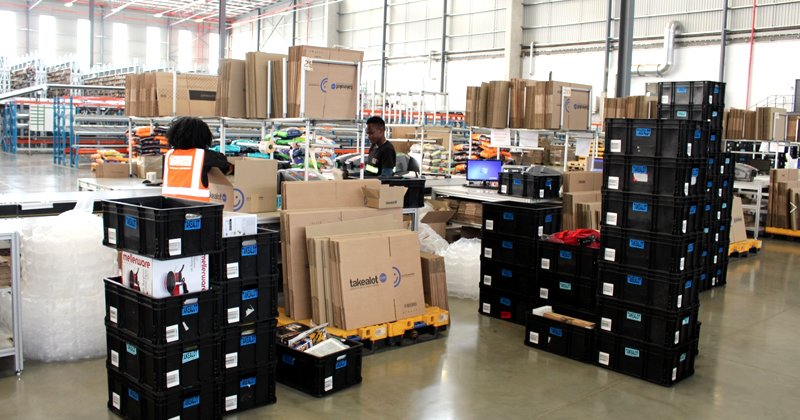This article was first published by TODAY on 19 June, 2018.

Valued at US$300 billion (S$400 billion), Africa’s digital economy is growing quickly.
Its huge potential has lured international digital players to the continent over the last five years. Jumia Group, backed by Germany’s Rocket Internet, has e-marketplaces in 23 African countries; Naspers, the world’s 7th largest internet company, has invested in South Africa’s top e-marketplace Take-A-Lot.

Local entrepreneurs have also emerged. Equivalents of Singapore’s own Ninja Van have popped up across Africa, including Parcel Ninja, which supports e-commerce businesses via its paperless warehouses in South Africa.
The world’s top mobile money operator, Safaricom (creators of M-Pesa) has launched an e-marketplace, Masoko, offering products ranging from electronics to food.
So, can Singapore companies have a bite of the cherry too?
The answer is definitely yes.
By 2025, Africa’s e-commerce market is estimated to be worth US$75 billion. This is driven by its three largest economies with the highest number of tech hubs – Nigeria, South Africa and Kenya. Together, they account for more than 50 per cent of Africa’s Internet users.
Nigeria is the third largest mobile commerce market in the world.
E-commerce across these three countries is expected to grow between 28 and 39 per cent annually, comparable to emerging Southeast Asia (25 per cent) and India (30-34 per cent).
Some Singapore companies have gained early success in Africa.
Visenze, an analytics company provides visual search solutions for South African fashion e-commerce website, Spree.
Strontium’s flash disks are sold on e-marketplace Take-A-Lot. Singapore’s e-marketplace provider, Arcadier, is looking to develop a cocoa trading e-marketplace in Nigeria.
Our homegrown payment solutions providers have also made their entry. For example, TransferTo is facilitating cross-border mobile payments for Africa’s largest telcos – Safaricom, MTN and Airtel.
Red Dot Payment is partnering a top Kenyan bank to facilitate multiple international payment methods for its customers across east Africa.
Even traditional Singapore wholesale traders such as consumer electronics distributor Tri Star Electronics is setting up an online e-marketplace in Kenya to increase distribution beyond its brick-and-mortar stores. While Singapore companies stand a chance, they must understand what the market needs and bring a unique value proposition to the table. This is what the above companies have in common.
So what areas should Singapore companies focus on in the key markets of Nigeria, South Africa and Kenya?
- Retail
Africa’s top e-marketplaces Jumia, Take-A-Lot, KiliMall and Konga offer Singapore brands easy and direct access to the African consumer. Most of the local e-marketplaces purchase foreign goods directly, hold inventory for brands or sell on consignment, lowering costs for sellers.
As Africa urbanises, the demand for choices and foreign products is rising. Foreign brands such as Mango, Samsung and Sony are among the most popular brands.
What is critical is that Singapore companies must recognise the diverse differences in business landscape, consumer behaviour and spending power across Africa. They must also adjust business plans accordingly in different countries, including pricing strategies.
In Nigeria and Kenya, the demand for retail is rising sharply, but there is a lack of shopping malls, causing retail prices to be high. In South Africa, retail malls are in abundance but have limited offerings. Consumers seek more choices and the convenience of online shopping.
During my three-year stint in Africa, I observe that Nigerians are generally more brand-conscious while Kenyans tend to opt for the best deals. - Services
Africa’s booming e-commerce fuels demand for complementary services across the value chain, which are currently lacking in the market. Singapore firms with sophisticated e-commerce solutions can capture early mover advantage, especially in artificial intelligence and data analytics.
After partnering Visenze, Spree clinched the CXA Digital Innovator Award for being the first African online retailer to introduce an image-based search feature. - Logistics
According to a survey by PayPal, Nigeria leads cross-border e-commerce growth at over 85 per cent a year, followed by South Africa at 42 per cent. Major infrastructure developments, such as the railway connecting Kenya’s port city Mombasa to capital city Nairobi, are set to improve the continent’s supply chain and reduce logistics costs.
There is much potential here as Africa’s e-marketplaces currently rely on international carriers for cross-border fulfilment to their key markets such as the United States, United Kingdom and China. These are countries where Singapore logistics firms such as PIL, YCH, Yang Kee Logistics and more have built a comprehensive network of supply chain assets.
Singapore players are in an advantageous position as our logistics solutions are known to be competitive and secure with high fulfilment rates, a plus among African e-marketplaces.
Not-so-Unique Challenges
Challenges remain while navigating Africa’s diverse and complex e-commerce landscape, but these are largely similar to other emerging markets such as Southeast Asia. Two key challenges are low bank card penetration and limited connectivity outside of major cities. Therefore, Singapore firms expanding to Africa must keep that in mind and integrate local mobile wallets as payment options.
However, there are strong reasons for Singapore firms to be optimistic.
Africa is clearly set for an e-commerce boom.
By 2025 – one in five people will be living in Africa. Africa has the largest youth population in the world, with 70 per cent of its 1.2 billion population below 30 years old. This is a large pool of young, tech-savvy consumers that Singapore companies can tap on.

Africa’s middle class is growing, with 65 per cent of consumer spending attributed to the youth. By 2025, youth will dominate Africa’s S$2.8 trillion consumer spending. Youths are more willing to experiment with lesser-known foreign brands, giving Singapore brands an advantage.
Over the past year, Enterprise Singapore has led 10 Singapore companies to the top three tech hubs in Africa – South Africa, Nigeria and Kenya – to learn about the opportunities arising from Africa’s digital economy, and network with potential African partners and clients.
Singapore companies such as Red Dot Payment and Arcadier have since entered the market and seen success.
Earlier this month, Enterprise Singapore opened its third regional office in the continent in Nairobi, Kenya, to help Singapore companies capture opportunities in East Africa.
Competition in Africa is intensifying, and the continent has started to garner international attention. To get a slice of Africa’s e-commerce pie early, Singapore firms should act fast and get in now.
About the author
Faridah Mohd Saad recently completed a three-year stint as Enterprise Singapore’s Regional Director based in Johannesburg, identifying business opportunities for Singapore companies and facilitating their entry into the Sub-Saharan Africa market.

